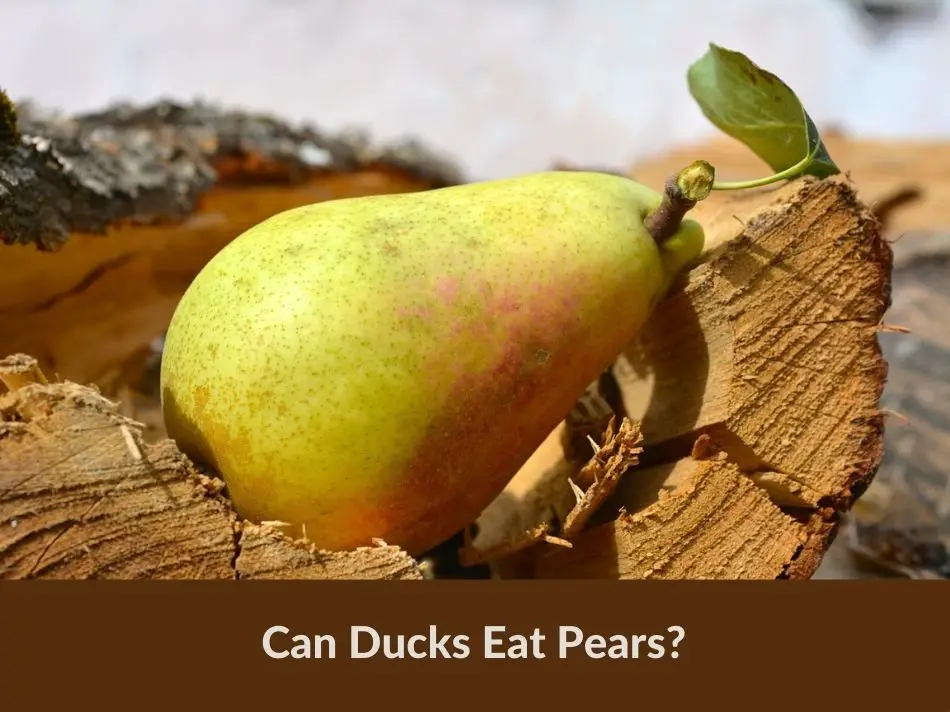Ducks are omnivores with a varied diet, ranging from small insects and aquatic plants to grains and vegetables. Their versatile palate allows them to enjoy a mix of proteins, greens, and even certain fruits. But, can ducks eat pears?
Yes, ducks can certainly enjoy pears! Pears are a safe and nutritious treat for ducks, as long as they are given in moderation. Remember to removed the seeds since they contain traces of cyanide, which can be harmful for ducks in large quantities.
In this article, we dive into the world of ducks and their dietary preferences. We talk about the consumption of pears by ducks, the nutritional benefits it offers them, and delve deeper into the realm of fruits suitable for our web-footed friends.
How Often Can I Feed My Ducks Pears?
Pears, like other fruits, should be considered a treat rather than a staple in a duck’s diet. Offering pears once or twice a week is sufficient. Too many pears might upset their digestive system or make them less inclined to eat their regular, more nutritious feed.
Can Ducklings Eat Pears?
Yes, ducklings can have pears but in smaller, more manageable sizes. It’s crucial to monitor them while they eat to avoid any potential risks.
Are Pears Healthy For Ducks?
Pears are a powerhouse of nutrition and can offer ducks a wide variety of vitamins, minerals, and dietary fiber. Here’s an insight into what makes pears beneficial for our feathered friends:
- Vitamins: Pears are a good source of essential vitamins such as vitamin C, vitamin K, and vitamin B6. Vitamin C is vital for a duck’s overall health, aiding in wound healing and ensuring their immune system remains robust. Vitamin K, on the other hand, is crucial for blood clotting processes.
- Minerals: Ducks can benefit from the essential minerals found in pears, such as potassium, magnesium, and calcium. Potassium helps maintain a duck’s muscle function and keeps their heart healthy, while calcium is essential for strong bones and eggshell formation.
- Dietary Fiber: Pears, being high in fiber, aid in the digestive process of ducks. The fiber helps move food through their digestive system smoothly, preventing constipation or digestive disturbances.
- Natural Sugars: The fructose in pears provides an instant energy source for ducks. This can be particularly useful for active ducks that need a quick energy boost.
- Water Content: Pears have a high water content, which helps in keeping ducks hydrated, especially during warmer days.
- Antioxidants: Pears contain a range of antioxidants, such as quercetin, which helps protect the duck’s cells against damage from free radicals. This is especially important for ducks living in polluted environments.
How To Feed Pears To Ducks
Feeding pears to ducks can be a delightful treat for them, but it’s essential to do it correctly to ensure the ducks derive maximum benefits without any potential risks.
Here’s a step-by-step guide:
- Select Fresh Pears: Always opt for fresh, ripe pears without any signs of mold or decay. Organic pears are a preferred choice as they are free from harmful pesticides and chemicals.
- Wash Thoroughly: Even if you’re using organic pears, always wash them under running water to remove any dust or potential contaminants.
- Remove the Seeds: Pear seeds contain traces of cyanide which can be harmful in large quantities. Although a few seeds might not be harmful, it’s always a good practice to remove them entirely to avoid any risk.
- Cut Into Manageable Pieces: Chop the pears into small, bite-sized pieces suitable for the duck’s mouth size. This ensures that the ducks can easily eat the pear without any choking hazards.
- Mix With Other Foods: Instead of just feeding pears, consider mixing them with other nutritious foods like grains or vegetables. This diversifies the duck’s diet, ensuring they get a range of nutrients.
- Limit the Quantity: As beneficial as pears can be, they shouldn’t constitute a significant portion of the duck’s diet. A few pieces as a treat or a dietary supplement are enough. Remember, overfeeding any fruit can lead to diarrhea or other digestive issues.
- Provide Fresh Water: Ensure that fresh water is always available when feeding ducks any kind of food. Ducks use water to help them swallow and digest food. After consuming sticky or sweet fruits like pears, ducks will especially appreciate a drink to wash it down.
More Fruits Ducks Can Eat
Ducks have quite a varied diet and can eat a plethora of fruits, which not only provide them with essential vitamins and minerals but also add variety to their meals. Just as with pears, many other fruits are safe and nutritious for ducks when offered in moderation.
Below are more fruits ducks can safely eat:
Make sure to see our thorough list of fruits ducks can enjoy.
Conclusion
Feeding ducks can be a rewarding experience for both caretakers and park visitors. While it’s delightful to watch ducks munch on treats like pears, it’s imperative to understand their dietary needs and offer foods that are safe and beneficial.
Next time you’re at a park and have some pear pieces, know that sharing them with the ducks nearby can be a treat for both you and them. Just remember to be mindful of the quantity and always provide fresh water.
Disclaimer: The information in this article is for informational purposes only. I'm not an expert or a veterinarian.


